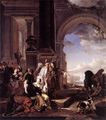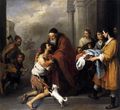Difference between revisions of "Category:Prodigal Son (subject)"
| (23 intermediate revisions by the same user not shown) | |||
| Line 1: | Line 1: | ||
*[[:Category:Events|BACK TO THE EVENTS--INDEX]] | |||
The ''' Prodigal Son''' was one of the [[Parables of Jesus]], according to the Gospel of Luke (15:11-32). | The ''' Prodigal Son''' was one of the [[Parables of Jesus]], according to the Gospel of Luke (15:11-32). | ||
<''Fiction'' : [[Prodigal Son (art)]] -- [[Prodigal Son (cinema)]] -- [[Prodigal Son (literature)]] -- [[Prodigal Son (music)]] > | |||
==Overview== | ==Overview== | ||
==The Prodigal Son in ancient sources== | Three are the major characters of the parable. The Father (=God), the unfaithful son (who sinned but was then justified), and the faithful son (who did not leave the house but was displeased by his Father's mercy). | ||
====Gospel of Luke==== | |||
The goal of the parables is to announce the good news that a second chance (justification) is given to the sinners who repent. The parable also teaches the righteous not to complain for the justification of the sinners, which does not deprive them of the promised salvation. | |||
==The Prodigal Son in | ==The Prodigal Son, in ancient sources== | ||
====[[Gospel of Luke]]==== | |||
Luke 15:11-32 (NRSV) -- '' [11] Then Jesus said, "There was a man who had two sons. [12] The younger of them said to his father, 'Father, give me the share of the property that will belong to me.' So he divided his property between them. [13] A few days later the younger son gathered all he had and traveled to a distant country, and there he squandered his property in dissolute living. [14] When he had spent everything, a severe famine took place throughout that country, and he began to be in need. [15] So he went and hired himself out to one of the citizens of that country, who sent him to his fields to feed the pigs. [16] He would gladly have filled himself with the pods that the pigs were eating; and no one gave him anything. [17] But when he came to himself he said, 'How many of my father's hired hands have bread enough and to spare, but here I am dying of hunger! [18] I will get up and go to my father, and I will say to him, "Father, I have sinned against heaven and before you; [19] I am no longer worthy to be called your son; treat me like one of your hired hands."' [20] So he set off and went to his father. But while he was still far off, his father saw him and was filled with compassion; he ran and put his arms around him and kissed him. [21] Then the son said to him, 'Father, I have sinned against heaven and before you; I am no longer worthy to be called your son.' [22] But the father said to his slaves, 'Quickly, bring out a robe--the best one--and put it on him; put a ring on his finger and sandals on his feet. [23] And get the fatted calf and kill it, and let us eat and celebrate; [24] for this son of mine was dead and is alive again; he was lost and is found!' And they began to celebrate. [25] "Now his elder son was in the field; and when he came and approached the house, he heard music and dancing. [26] He called one of the slaves and asked what was going on. [27] He replied, 'Your brother has come, and your father has killed the fatted calf, because he has got him back safe and sound.' [28] Then he became angry and refused to go in. His father came out and began to plead with him. [29] But he answered his father, 'Listen! For all these years I have been working like a slave for you, and I have never disobeyed your command; yet you have never given me even a young goat so that I might celebrate with my friends. [30] But when this son of yours came back, who has devoured your property with prostitutes, you killed the fatted calf for him!' [31] Then the father said to him, 'Son, you are always with me, and all that is mine is yours. [32] But we had to celebrate and rejoice, because this brother of yours was dead and has come to life; he was lost and has been found.'" '' | |||
==The Prodigal Son, in the arts== | |||
<gallery> | |||
File:Prodigal Guercino.jpg|[[Return of the Prodigal Son (1619 Guercino), art]] | |||
File:Prodigal Honthorst.jpg|[[Prodigal Son (1622 Honthorst), art]] | |||
File:Prodigal2 Guercino.jpg|[[Return of the Prodigal Son (1651 Guercino), art]] | |||
File:Prodigal Rosa.jpg|[[The Prodigal Son (1655 Rosa), art]] | |||
File:Prodigal Weenix.jpg|[[Prodigal Son (1668 Weenix), art]] | |||
File:Prodigal Rembrandt.jpg|[[Return of the Prodigal Son (1669 Rembrandt), art]] | |||
File:Prodigal Murillo.jpg|[[Return of the Prodigal Son (1670 Murillo), art]] | |||
File:Prodigal Batoni.jpg|[[Return of the Prodigal Son (1773 Batoni), art]] | |||
File:Prodigal Mozier.jpg|[[Return of the Prodigal Son (1857 Mozier), art]] | |||
File:Prodigal Poynter.jpg|[[The Prodigal's Return (1869 Poynter), art]] | |||
File:Prodigal Swan.jpg|[[Prodigal Son (1888 Swan), art]] | |||
File:Prodigal Rodin.jpg|[[Prodigal Son (1889 Rodin), art]] | |||
File:Prodigal Siemiradzki.jpg|[[Return of the Prodigal Son (1890c Siemiradzki), art]] | |||
File:Prodigal Ferenczy.jpg|[[Return of the Prodigal Son (1908 Ferenczy), art]] | |||
File:Prodigal Mayo.jpg|[[Return of the Prodigal Son (1923 Mayo), art]] | |||
File:Prodigal Warneke.jpg|[[Return of the Prodigal Son (1938 Warneke), art]] | |||
File:Prodigal Dalí.jpg|[[Filius prodigus (Prodigal Son / 1964 Dalí), art]] | |||
</gallery> | |||
==External links== | ==External links== | ||
*[http://en.wikipedia.org/wiki/Prodigal_Son Wikipedia] | *[http://en.wikipedia.org/wiki/Prodigal_Son Wikipedia] | ||
[[Category: | |||
[[Category:Events]] | [[Category:Index (database)]] | ||
[[Category:Events (database)]] | |||
Latest revision as of 05:38, 8 March 2017
The Prodigal Son was one of the Parables of Jesus, according to the Gospel of Luke (15:11-32).
<Fiction : Prodigal Son (art) -- Prodigal Son (cinema) -- Prodigal Son (literature) -- Prodigal Son (music) >
Overview
Three are the major characters of the parable. The Father (=God), the unfaithful son (who sinned but was then justified), and the faithful son (who did not leave the house but was displeased by his Father's mercy).
The goal of the parables is to announce the good news that a second chance (justification) is given to the sinners who repent. The parable also teaches the righteous not to complain for the justification of the sinners, which does not deprive them of the promised salvation.
The Prodigal Son, in ancient sources
Gospel of Luke
Luke 15:11-32 (NRSV) -- [11] Then Jesus said, "There was a man who had two sons. [12] The younger of them said to his father, 'Father, give me the share of the property that will belong to me.' So he divided his property between them. [13] A few days later the younger son gathered all he had and traveled to a distant country, and there he squandered his property in dissolute living. [14] When he had spent everything, a severe famine took place throughout that country, and he began to be in need. [15] So he went and hired himself out to one of the citizens of that country, who sent him to his fields to feed the pigs. [16] He would gladly have filled himself with the pods that the pigs were eating; and no one gave him anything. [17] But when he came to himself he said, 'How many of my father's hired hands have bread enough and to spare, but here I am dying of hunger! [18] I will get up and go to my father, and I will say to him, "Father, I have sinned against heaven and before you; [19] I am no longer worthy to be called your son; treat me like one of your hired hands."' [20] So he set off and went to his father. But while he was still far off, his father saw him and was filled with compassion; he ran and put his arms around him and kissed him. [21] Then the son said to him, 'Father, I have sinned against heaven and before you; I am no longer worthy to be called your son.' [22] But the father said to his slaves, 'Quickly, bring out a robe--the best one--and put it on him; put a ring on his finger and sandals on his feet. [23] And get the fatted calf and kill it, and let us eat and celebrate; [24] for this son of mine was dead and is alive again; he was lost and is found!' And they began to celebrate. [25] "Now his elder son was in the field; and when he came and approached the house, he heard music and dancing. [26] He called one of the slaves and asked what was going on. [27] He replied, 'Your brother has come, and your father has killed the fatted calf, because he has got him back safe and sound.' [28] Then he became angry and refused to go in. His father came out and began to plead with him. [29] But he answered his father, 'Listen! For all these years I have been working like a slave for you, and I have never disobeyed your command; yet you have never given me even a young goat so that I might celebrate with my friends. [30] But when this son of yours came back, who has devoured your property with prostitutes, you killed the fatted calf for him!' [31] Then the father said to him, 'Son, you are always with me, and all that is mine is yours. [32] But we had to celebrate and rejoice, because this brother of yours was dead and has come to life; he was lost and has been found.'"
The Prodigal Son, in the arts
External links
Pages in category "Prodigal Son (subject)"
The following 26 pages are in this category, out of 26 total.
1
- Dialogo del Figliuol Prodigo (The Prodigal Son / 1619 Anerio), sacred dialogue
- Return of the Prodigal Son (1619 Guercino), art
- Prodigal Son (1622 Honthorst), art
- Return of the Prodigal Son (1651 Guercino), art
- The Prodigal Son (1655 Rosa), art
- Prodigal Son (1668 Weenix), art
- Return of the Prodigal Son (1669 Rembrandt), art
- Return of the Prodigal Son (1670 Murillo), art
- Il figliuol prodigo (The Prodigal Son / 1697 Biffi / Ciallis), oratorio
- Il figliuol prodigo (The Prodigal Son / 1712 Orlandini / Pamphili), oratorio
- Il ritorno del figliuol prodigo (The Return of the Prodigal Son / 1753 Bertoni), oratorio
- Il figliuol prodigo (The Prodigal Son / 1753 Felici / Pasquini), oratorio
- Il figliuol prodigo (The Prodigal Son / 1792 Anfossi / Femi), oratorio
- Return of the Prodigal Son (1857 Mozier), art
- The Prodigal (1869 Osborn), play
- Il figliuol prodigo (The Prodigal Son / 1880 Ponchielli), opera
- Prodigal Son (1888 Swan), art
- Prodigal Son (1889 Rodin), art
- Return of the Prodigal Son (1890c Siemiradzki), art
- Return of the Prodigal Son (1908 Ferenczy), art
- Return of the Prodigal Son (1923 Mayo), art
- Return of the Prodigal Son (1938 Warneke), art
- The Prodigal (1955 Thorpe), feature film
- Filius prodigus (Prodigal Son / 1964 Dalí), art
- The Prodigal Son (1968 Britten / Plomer), opera (music & libretto)
















